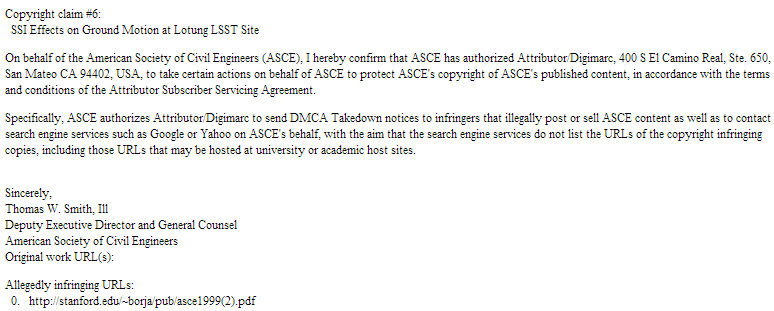TorrentFreak Email Update |
| Publisher Targets University Researchers for “Pirating” Their Own Articles Posted: 16 May 2014 02:17 AM PDT
Unfortunately it's not always easy for academics to share their work. Most of the top publications are being monetized by major publishers, which means that they are locked behind a paywall that’s not open to the public. To make their work easier to access, many researchers host copies of their work on their personal profiles, usually hosted by their university. Interestingly, however, this usually means that they are committing copyright infringement. This is because most of the top publications ask the authors, who work for free, to sign away all their copyrights if they want their paper to be published. While many journals allow this type of limited non-commercial infringement by the authors, the American Society of Civil Engineers (ASCE) clearly doesn’t. The professional association publishes dozens of journals and during the past few weeks began a crack down on “pirating” researchers. The publisher has hired the piracy protection firm Digimarc to police the internet for articles that are posted in the wild. As a result, universities all across the globe were targeted with takedown notices, which were also sent to Google in some cases. The list of rogue researchers is long, and includes professors from MIT, Stanford, Northwestern University, University of Washington, UC Berkeley, University of Michigan, University of Wisconsin–Madison and many international universities. In the takedown notices Digimarc writes that the publisher has authorized their company “to send DMCA Takedown notices to infringers that illegally post or sell ASCE content.” In other words, ASCE is branding their own authors as pirates because they’re sharing the own work. Below is an example of a takedown notice for a paper written by Ronaldo Borja, Professor, Department of Civil and Environmental Engineering at Stanford.  In this case the article is still available on the Stanford website, and Google has also refused to take it out of their search results. The same is true for articles published on the websites of MIT and UC Berkeley. However, there are other universities which have indeed disabled access to the articles in question. Several articles posted on the websites of the University of Wisconsin–Madison and the University of Texas have disappeared, for example. University of Michigan Professor Radoslaw Michalowski also removed an article that was linked from his list of publications. The question remains whether ASCE is wise to target their own authors, and the universities who pay them. After all, the publisher relies on these very people to keep its journals filled. In any case, it’s a sad state of affairs for these researchers to put years of hard work into their articles, only to be told they can’t share them with the world. Source: TorrentFreak, for the latest info on copyright, file-sharing and anonymous VPN services. |
| Popcorn Time Users Get ‘Fined’ By Copyright Trolls Posted: 15 May 2014 09:44 AM PDT
Even after several controversies, including the retirement of both the original team and the developers who subsequently took over the project, the software lives on in various forms. One of the more successful variants, known as Cuevana Storm, is less known in English-speaking regions since it’s presented in Spanish. However, several users in Germany are now dealing with issues arising from its use. Yesterday, German lawfirm GGR Law reported that three of its clients had received demands for cash settlements from the Waldorf Frommer law firm based on allegations of copyright infringement. However, during discussions all of the recipients insisted that they had never installed a BitTorrent client on their machines. Instead they had used only streaming services. The use of unauthorized streaming sites came to the forefront in Germany during December 2013 when users of the RedTube site suddenly started receiving settlement demands from the U & C lawfirm. That provoked a government announcement in January this year that viewing pirated streams is not illegal. So are these latest settlement demands for 815 euros each just another attempt at illegally extorting cash following legal stream views? Firstly and importantly, the letter recipients believed that the content in question had been accessed via streaming – certainly, nothing had been accessed via BitTorrent. However, this is where the confusion lies. While the interfaces of Cuevana Storm / Popcorn time give the impression of server-to-client streaming (like YouTube), both have BitTorrent under the hood. This means that while streaming video to the inbuilt player, content is also being uploaded to other users, just as it would in any regular BitTorrent swarm. “In the warnings from the Waldorf Frommer law firm, Cuevana.tv isn´t mentioned. Also it is not stated that this is a streaming warning letter,” GGR lawyer Tobias Röttger told TorrentFreak. “The warning letter is the classic standard file-sharing warning letter, which the law firm Waldorf Frommer has used for some time. The culprit was accused of uploading the file via BitTorrent. I suspect that Waldorf Frommer don´t know that the download was made over Cuevana.tv.” The above illustrates why it is extremely important for people to have at least a cursory understanding of how software on their machine operates. Streaming video server-to-client or server-to-web browser is either legal or at the least non-detectable in most Western countries. Uploading content to others without permission is generally illegal. For some the difference between the two will only be discovered after receiving a fine for hundreds or maybe thousands of dollars. Source: TorrentFreak, for the latest info on copyright, file-sharing and anonymous VPN services. |
| You are subscribed to email updates from TorrentFreak To stop receiving these emails, you may unsubscribe now. | Email delivery powered by Google |
| Google Inc., 20 West Kinzie, Chicago IL USA 60610 | |

